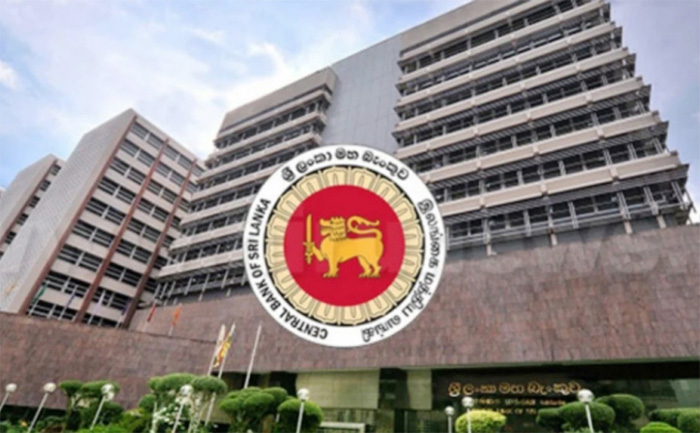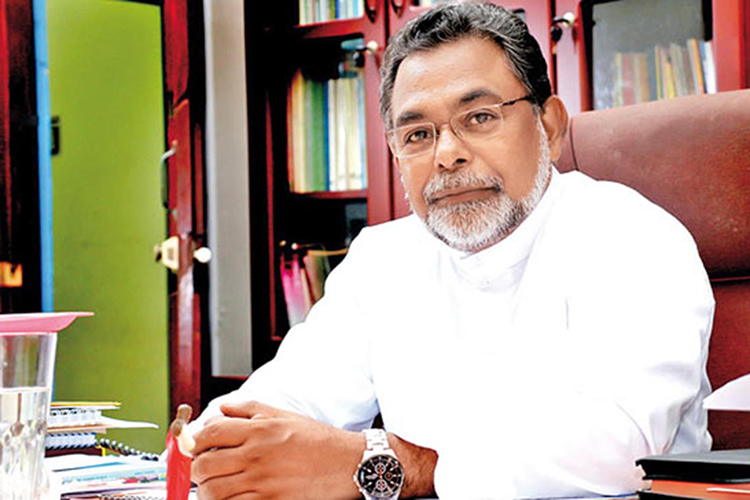News
Kataragama Kapuwa’s arrest sparks debate of divine offerings

by Amal Jayasinghe
The controversial arrest of Sri Lanka’s senior most Kapuwa, or the intermediary between devotee and deity, has renewed a debate over who should benefit from the valuable offerings to the gods.
Somipala Ratnayake, the chief “Kapuwa” at the Kataragama Maha Devale was taken into custody on Wednesday over a missing gold tray said to be worth over 6.4 million rupees. He was enlarged on bail of half a million rupees.
He was also ordered to report to the Colombo Crime Division on the last Sunday of every month pending the conclusion of the case.
“He was arrested following a complaint that a gold ornament gifted to Lord Murugan had disappeared from the shrine under his watch two years ago,” a police official said.
He said Ratnayake, who is in his mid 80s, was charged with “criminal breach of trust” over the loss of the gold tray which had been gifted to the god by a devotee many years ago.
Police said the ornament had been offered to the gods by the wife of a drug dealer. With the devale not subject to the Central Bank’s rigorous “know your customer – KYC” regulations, accepting such expensive gifts purchased with questionable earnings is not an offence.
An investigator familiar with the crisis at Kataragama said it was difficult to maintain a case of breach of trust over the allegedly missing gold tray because it was difficult to establish the beneficial ownership of the offering.
“If we charge anyone for breaching the trust of gods, who will speak on behalf of the gods?” the investigator asked. Any judicial interpretation of ownership of what is offered to the gods could have serious implications over a matter of faith.
The arrest of the Kapuwa and the surrounding controversy would also test the belief system.
A lay custodian of the shrine had raised the alarm over the apparent loss of the gold tray in 2021 and the Basnayake Nilame, the chief lay custodian of the Kataragama devale had lodged a police complaint.
However, a fellow Kapuwa, Lal Arapaksha maintained that any offerings to the gods belonged to the celebrant according to a tradition maintained at the centuries-old shrine.
“The Kapuwa who conducts a pooja (ritual) is entitled to any offerings, there is no question of theft,” Arapaksha said.
“Sometimes a nail manufacturer would offer some of his products to Lord Murugan. What will he do with nails, so we either give it to a builder or turn it into cash. That is for the upkeep of the shrine. There are 10 Kapuwas and each has about 20 to 30 helpers who have to be maintained with the offerings they receive from devotees.”
Sri Lanka is predominantly Buddhist, a faith that does not typically recognize deities, but local practice incorporates elements of Hindu and animistic worship.
It is common for Buddhist priests to invoke the blessings of 330 million gods during their sermons, a reference to the Hindu pantheon.
Kataragama is highly venerated by Buddhists as well as the faithful from the minority Hindu, Muslim and Christian communities who believe in the power of Lord Murugan.
Two months ago, a group of Kapuwas staged a token strike over a pay dispute and refused to perform rituals at another shrine – the Seenigama devale — known for helping pilgrims place curses on their enemies.
Here is a brief account of what happens to the offerings at Kataragama.
There are 10 Kapuwas who conduct poojas (rituals).
Each get one month a year to conduct rituals. Two months of the year is set aside for the Basnayaka Nilame, the lay custodian. He can employ anyone of his choice for this period and all offerings are at the disposal of the Nilame.
All cash, jewellery and any other valuables offered to Lord Murugan becomes the property of the Kapuwa who conducts the pooja.
Each Kapuwa is also responsible for the upkeep of the shrine during his month of poojas. He also must pay the 30 to 40 helpers he may employ. Monies that get collected in tills at the shrine come under the administration of the Basnayake Nilame.
It is not clear whether the Kapuwas, Basnayake Nilame have to declare the income for tax purposes and whether there are records of the offerings made by the faithful devotees.
News
CEB engineers raise alarm over power sector stability

A senior electrical engineers attached to the Ceylon Electricity Board (CEB) have warned that unresolved structural and policy issues within the power sector could threaten the long-term stability of the national grid, urging authorities to act swiftly to address mounting technical and administrative concerns.
Speaking on condition of anonymity, they said the electricity network was operating under increasing strain due to delayed infrastructure upgrades, financial constraints, and growing demand.
“The national grid is not something that can be managed casually. It requires systematic planning, preventive maintenance, and timely investment. If these are compromised, the risk to system stability increases,” the engineers said.
They noted that several transmission and substation modernisation projects were behind schedule, while ageing thermal plants continued to shoulder a significant portion of the country’s base load demand.
“Engineers are committed to ensuring an uninterrupted supply. But professional expertise must be respected in decision-making. Technical matters cannot be subjected to short-term political considerations,” the engineers added.
Meanwhile, the powerful Ceylon Electricity Board Engineers’ Union (CEBEU) echoed similar concerns, warning that failure to address long standing professional and structural issues could have serious consequences for the power sector.
In a statement, the CEBEU has said that engineers have repeatedly called for reforms that safeguard the integrity of the utility and ensure that operational decisions remain grounded in technical evaluation.
“The electricity sector is a critical national asset. Any attempt to weaken institutional safeguards or bypass professional consultation will directly impact service reliability and long-term sustainability,” the union said.
The CEBEU has stressed the importance of transparent engagement between policymakers and technical personnel, noting that morale among engineers could be affected if their concerns continue to go unheard.
Industry analysts point out that the power sector plays a central role in Sri Lanka’s economic recovery efforts, particularly as the country seeks to expand industrial activity and attract investment. Stability in electricity supply remains a key determinant of business confidence.
The senior engineer stressed d that the objective of raising concerns is not confrontation but preservation of the grid’s integrity.
“Our responsibility is to the public. Electricity powers hospitals, industries, and homes. Safeguarding the system is a national duty,” he said.
With tensions simmering within the sector, stakeholders say meaningful dialogue between authorities, engineers, and trade unions will be crucial in ensuring that Sri Lanka’s power infrastructure remains resilient in the face of growing challenges.
By Ifham Nizam
News
CB identifies 24 pyramid scams in Sri Lanka

The Central Bank (CBSL) yesterday announced that investigations had identified 24 companies and applications operating prohibited pyramid schemes.
In a public notice issued under Section 83C of the Banking Act, No. 30 of 1988 (as amended), the CBSL said the following entities had been “ascertained and determined as prohibited schemes”: Tiens Lanka Health Care (Pvt) Ltd, Best Life International (Pvt) Ltd, Mark–Wo International (Pvt) Ltd, V M L International (Pvt) Ltd, Global Lifestyle Lanka (Pvt) Ltd, Fast3Cycle International (Pvt) Ltd, Sport Chain App / Sport Chain ZS Society Sri Lanka, OnmaxDT, MTFE App / MTFE SL Group / MTFE Success Lanka / MTFE DSCC Group, Fastwin (Pvt) Ltd, Fruugo Online App / Fruugo Online (Pvt) Ltd, Ride to Three Freedom (Pvt) Ltd, Qnet / Questnet, Era Miracle (Pvt) Ltd and Genesis Business School, Ledger Block, Isimaga International (Pvt) Ltd, Beecoin App and Sunbird Foundation, Windex Trading, The Enrich Life (Pvt) Ltd, Smart Win Entrepreneur (Pvt) Ltd, Net Fore International (Pvt) Ltd / Netrrix, Pro Care (Pvt) Ltd and Shade of Procare (Pvt) Ltd, SGO / sgomine.com and I.C.A.N Advertising (Pvt) Ltd and its affiliates icanonlineadvertising.com, bannercuts.com, bannercuts.lk, bannercuts.net and bannercuts.org
The CBSL said pyramid schemes, also referred to as multi-level marketing or direct selling schemes in certain instances, operate as recruitment-based programmes in which members enlist others into an expanding “downline” structure resembling a chain letter.
Under such arrangements, a portion of the fees paid by new recruits is channelled upwards to earlier participants, known as the “upline”, who are fewer in number.
The Central Bank warned that such schemes are inherently unsustainable, with the vast majority of participants at the lower tiers eventually losing their investments, while only a small number of early entrants are able to recover or profit from the funds contributed by subsequent recruits. It noted that when a pyramid scheme collapses, up to 99 per cent of those in the lower levels risk losing their money.
News
Church urges patience, warns against interference with Easter attacks probe

Director of Communications for the Archdiocese of Colombo, Rev. Fr. Cyril Gamini Fernando, yesterday expressed confidence that ongoing investigations into the 2019 Easter Sunday terror attacks would yield meaningful results and urged the public and all stakeholders to exercise patience and allow the probe to proceed independently.
Addressing a media briefing in Colombo yesterday, Fr. Fernando called on all parties to refrain from interfering with the investigations, warning that any attempt to obstruct the process would amount to a grave injustice to the victims.
He said he believed there was credible evidence to warrant the arrest of military intelligence veteran Maj. Gen. (Retd.) Suresh Sallay.
Referring to the coordinated bombings on April 21, 2019, which targeted churches and hotels and claimed nearly 300 lives, Fr. Fernando described the attacks as a “barbaric” act and a “massacre” that killed worshippers attending Easter services as well as individuals from different religious and ethnic communities.
By Norman Palihawadane
-

 Features5 days ago
Features5 days agoWhy does the state threaten Its people with yet another anti-terror law?
-

 Features5 days ago
Features5 days agoReconciliation, Mood of the Nation and the NPP Government
-

 Features5 days ago
Features5 days agoVictor Melder turns 90: Railwayman and bibliophile extraordinary
-

 Features4 days ago
Features4 days agoLOVEABLE BUT LETHAL: When four-legged stars remind us of a silent killer
-

 Features5 days ago
Features5 days agoVictor, the Friend of the Foreign Press
-

 Latest News6 days ago
Latest News6 days agoNew Zealand meet familiar opponents Pakistan at spin-friendly Premadasa
-

 Latest News7 days ago
Latest News7 days agoECB push back at Pakistan ‘shadow-ban’ reports ahead of Hundred auction
-

 Latest News6 days ago
Latest News6 days agoTariffs ruling is major blow to Trump’s second-term agenda















